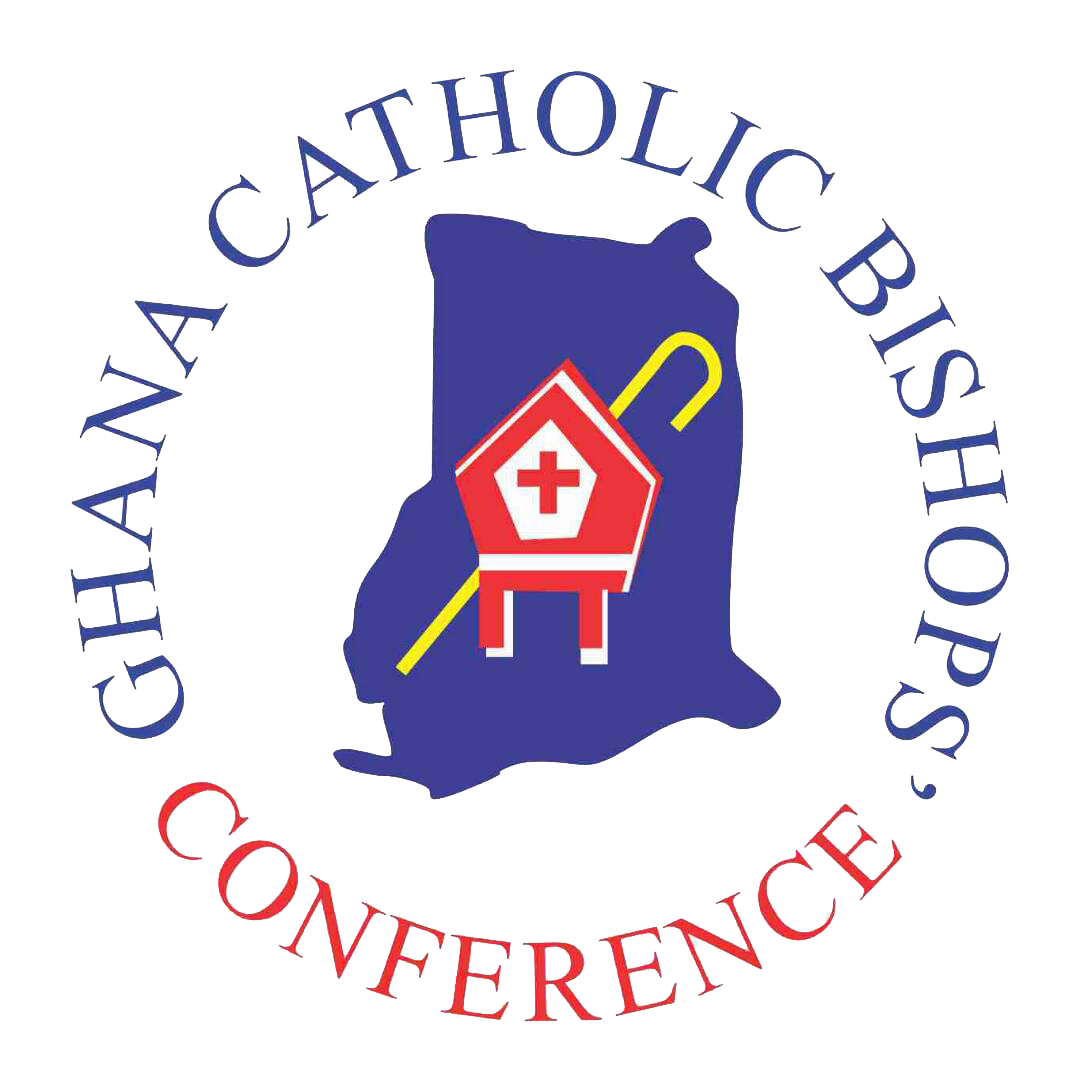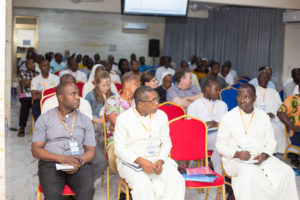 A four-day International Workshop on Church Management was held recently
A four-day International Workshop on Church Management was held recently
at the National Catholic Secretariat (NCS), Accra, under the auspices of the
Ghana Catholic Bishops’ Conference (GCBC) and the Program of Church
Management of the Pontifical University of the Holy Cross, Rome.
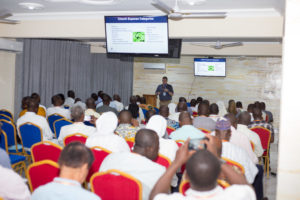 The workshop which has as its goal, the development of the technical and
The workshop which has as its goal, the development of the technical and
professional skills and abilities of Church leaders in their role as administrators,
had as participants, a large number of Catholic priests – mostly Financial
Administrators from the various Archdioceses and Dioceses of the Church in
Ghana, Representatives of Religious Congregations across the nation and some
Lay Leaders including some Senior Staff of the NCS.
The resource persons were renowned international Facilitators drawn from a
consortium of five Non-Governmental Organisations (NGOs) collaborating
from Germany and the United States of America.
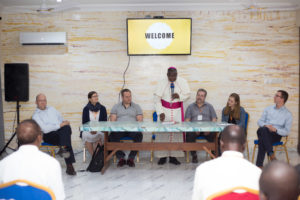 Most Rev. Philip Naameh, the Metropolitan Archbishop of Tamale and
Most Rev. Philip Naameh, the Metropolitan Archbishop of Tamale and
President of the Ghana Catholic Bishops’ Conference declared the workshop
opened at the newly reconstructed ultra-modern Conference Hall of the NCS on
Tuesday, 25th February 2020.
In his statement of welcome, Archbishop Naameh expressed profound gratitude
to the formidable team for travelling over very long distances in order to
facilitate the workshop. He disclosed that the workshop was the first of its kind
for the Church in Ghana and expressed optimism that it will offer to the
participants, the most up-to-date training and tools as well as introduce them to
new approaches, methodologies, managerial and organisational techniques
necessary for solving problems and preventing administrative crisis.
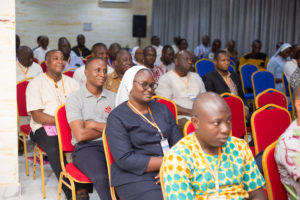 Having received the Episcopal welcome and gratitude, the team energetically
Having received the Episcopal welcome and gratitude, the team energetically
engaged the Catholic Church in Ghana (as represented by the participants) with
the realities of Church Management, with special focus on Church financials
and accountability, budgeting, financial controlling and auditing, fraud
prevention and detection.
Other important areas of Church life succinctly dealt with by the team included
Leadership and Governance, Communication in the Digital Age, Stewardship,
Accountability, Transparency and Lay Participation. Last but not the least was:
Funding the Mission: Fundraising Pipeline Planning.
 Delivering and discussing these inalienable components of Church Management
Delivering and discussing these inalienable components of Church Management
were the lead Speakers: Professor Mario Enzler who was a Former Swiss Guard
to Pope St. John Paul II; also a Former Swiss Banker and currently a Professor
at the Catholic University of America (CUA) and also Professor Matthew
Manion – Faculty Director for the Center for Church Management in the
Villanova University School of Business, Pennsylvania, United States.
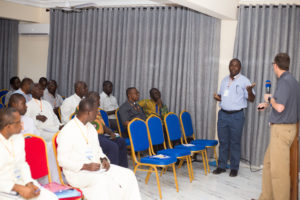 In their presentations, they established both the biblical foundations and the
In their presentations, they established both the biblical foundations and the
social teachings of the Church for Church management as they took the
participants through the Catechism of the Catholic Church, Canon Law, the
Wisdom of St. Augustine, Pope Francis’ Joy of the Gospel as well as excerpts
from the Old and New Testaments such as: “Lighten your burden by letting
the people bear it with you” (Ex.18:13-27) and “which of you, wishing to
construct a tower, will not sit down and calculate the costs…”? (Lk.14: 28-
33).
 They urged participants to move Church Management from mere compliance to
They urged participants to move Church Management from mere compliance to
ministry. “The Church exists to evangelise and the evangelisation ministry “is
expensive” therefore, the Church needs money. The lingering mentality among
the people that money will come from outside has to be discouraged. Money has
to be generated from within the Church. The Church needs to convince her
members that money is no longer coming from outside” the Speakers noted.
Professor Enzler reminded the participants that asking for money is in line with
the scriptures (Ask and you will receive – Matt. 7:7). He said that the priests
need to be in the forefront and ginger the people to bring out the money for the
Mission. However, he insisted that openness, transparency and accountability
have to be applied in dealing with Church money.
 Furthermore, priests should not just talk about money but also start some form
Furthermore, priests should not just talk about money but also start some form
of enterprise that will bring in money. Priests were also advised not to talk
about money in a manner that demoralises or shames parishioners. The priests
should also shun the temptation to become superstar pastors which may put
them on the path of financial insatiability.
Professor Matthew Manion dealt with issues of budgeting, financial controlling
and auditing while Professor Enzler handled fraud prevention and detection.
What came out vividly in these aspects of the presentations and discussions
were the need for each parish or diocese to establish and maintain sound Parish
financial committees with trusted and committed lay experts as members; carry
out both internal as well as external auditing and have a code of conduct with
ethical standards for parish or Diocesan workers. A project should be funded
before execution, in other words generate the funds first before spending it.
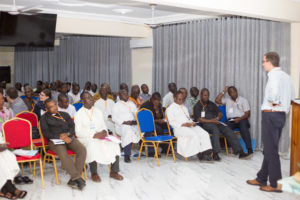 In the area of fraud prevention and detection, the Parish priest should as much
In the area of fraud prevention and detection, the Parish priest should as much
as possible avoid family and friends type of employment. Parish staff and others
engaged in parish finance, such as parish Sunday collection counters and
Ushers, account clerks and financial secretaries and treasurers should not be
kept for too long. Bank statements should be crosschecked and segregation of
duties maintained as part of financial control activities.
Leadership was also discussed and participants were made to understand that
what matters in a leader is self-awareness – knowing one’s strengths, emotions
and weaknesses; self –regulation –controlling and redirecting one’s disruptive
emotions and impulses; motivation – being driven to achieve for the sake of
achievement (beast mode) and Empathy – considering others feelings especially
when one makes decisions. Here, participants were encouraged to be leaders
who bring out the best in the people – to be multipliers and not diminishers.
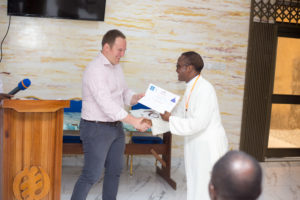 On Communication in the Digital Age, participants especially the priests were
On Communication in the Digital Age, participants especially the priests were
challenged to make their voices heard in the internet through face book, twitter
and other applications associated with social media and digital communication.
Professor Enzler said they priests should emulate the example of the Holy
Father, Pope Francis whom he said had over 60 million fans on his twitter
platform. Diocesan websites and parish social media platforms must be
established and managed in such a way that they become interesting arena for
digital natives such as the youth, veritable grounds for exchange of ideas and for
evangelisation for the faithful as well as for lapse Catholics and others.
The highly educative and formative workshop was rounded off on the fourth
day with a presentation by Mr Colin Howell, the Coordinator of the Team.
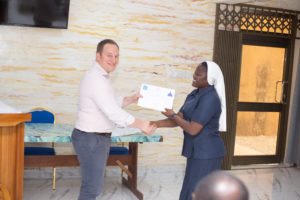 His presentation focused on ‘Funding the Mission’: Fundraising Pipeline
His presentation focused on ‘Funding the Mission’: Fundraising Pipeline
Planning. He stated that Fundraising is a ministry – a form of proclaiming the
Gospel. He reminded the participants that they need to ask for funds; they need to raise funds! He said to the priests, “one of your duties as priests is to remind
the people that the Church needs financial and intellectual support from them.
He said that true fundraising leads to friendraising where trust is established
through the natural process of friendship.
At the close of the workshop, the GCBC President, Most Rev, Philip Naameh
enjoined the participants to go back to train in their various Archdioceses and
Dioceses; priests, religious men and women and the layfaithful involved in
managing the temporal goods of the Church entrusted to their care.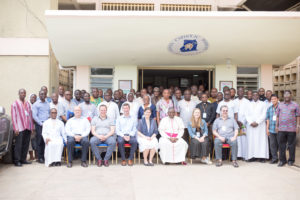
Present also were other members of the Team. They were Hannah Kohn –
representing the University of Santa Croce Foundation, Germany, and
Christoph Konopka and Clara Konopka – representing the Christian Adam
Foundation, also located in Germany.
By Sr. Elizabeth Mgbaramuko, SHCJ
DEPSOCOM, NCS

